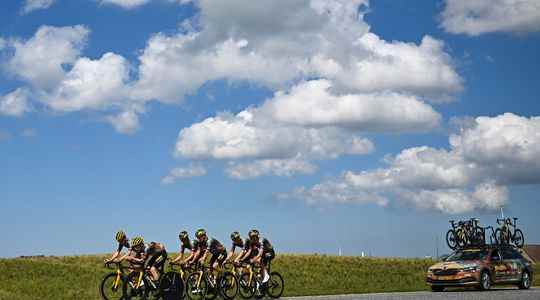It’s a turning point in the world of cycling. As the Tour de France begins this Friday, July 1, the Union Cycliste Internationale (UCI) announced on Tuesday June 28 that it was going to ease the rules of restrictions concerning riders sick with Covid. Until then, if a cyclist tested positive, the regulations required him to leave the race. This systematic banning of infected athletes could now end with the new health protocol. “The decision on possible isolation will be taken collectively by the doctor of the team concerned, the Covid-19 doctor of the event and the medical director of the UCI, on the basis of the clinical elements available”, is- he mentioned in the document unveiled on June 28. In practice, this means that athletes without symptoms will be able to continue pedaling in the middle of the peloton, even if this will require that they submit to a PCR test and that they benefit from the agreement of the referent doctors of the Tour. .
Since the resumption of cycling races in August 2020, the riders have had to comply with a particularly strict protocol. It imposed recurring tests on all staff and even provided for the exclusion of the team if three positive results occurred in the same week. Extremely damaging measures for the athletes, the teams and the organization, which had led to the abandonment in June of more than 40 riders on the last Tour of Switzerland, including the leader of the general classification, the Russian Aleksandr Vlasov, ousted after a positive test, only two days before the end of the competition.
At Wimbledon, the test is no longer compulsory
With the evolution of the epidemic, the organizers of these events pleaded for a relaxation of the constraints: “The situation that we are currently experiencing on the front of the pandemic is less worrying than that which we observed at the height of the health crisis” , justifies David Lappartient, president of the UCI, in a communicated on June 28. However, not everyone will be able to compete, only runners with a low viral load will be able to hit the road again. “Sometimes, these are positive tests on which we can very reasonably and without risk, lift the isolation because the patients will not be contagious”, assured the next day to West France the referent doctor of the TotalEnergies team Louis Noisette, who judges that today, “isolation no longer always makes sense”. Jacky Maillot, his Groupama-FDJ training counterpart, details the protocol in the regional daily: “If the rider is asymptomatic, we will first do a clinical examination, a blood test, to ensure that there is no there is no risk of myocarditis in particular”. A relaxation which benefited Luxembourg’s Bob Jungels, who tested positive but was deemed “non-contagious” and authorized to start the first stage “due to a slight viral load”.
Beyond cycling, it is a whole part of the sporting world, which has long remained padlocked by drastic rules, which is moving towards a paradigm shift. Across the Channel, the Wimbledon tournament has taken into account the requests for relaxation of the protocol, and since June 27, players are no longer forced to go through the swab box to participate. “We are following UK guidelines regarding the assessment and isolation of any potential infectious disease,” explains the Guardian a spokesman for the All England Club, which traditionally organizes the tournament.
A relief for professionals who plead for more accountability. “I think it’s a good thing that it’s the players themselves who decide to get tested if they have symptoms. (…) And I encourage anyone who experiences symptoms to get tested and to be responsible”, evoked during the London tournament Coco Gauff, finalist of Roland-Garros this year. Thus, in accordance with Wimbledon’s new health policy, nothing obliges a player who tested positive to abandon the tournament. However, this is what Matteo Berrettini, unfortunate finalist last year, did on his own, who gave up participating on Tuesday due to his contamination with Covid-19.
Decisions “against the flow of recommendations”
These new regulations thus leave the door open to athletes who would like to play despite the disease and their potential contagiousness. A flaw which, according to some athletes, was de facto exploited during the last Parisian tennis tournament. “At Roland-Garros, there was an epidemic of Covid, nobody spoke about it”, assured this week Alizé Cornet, the number one of French tennis, in a press conference, evoking a “tacit agreement” between the players so as not to reveal their affections.
In the context of a strong epidemic recovery in Europe as in France, under the effect of the BA.5 sub-variant, these adjustments in the rules of isolation leave doubts however. With more than 79,000 cases per day on average this week, is this the right time to lift the constraints? “That everyone is fed up with the restrictions imposed by this pandemic is understandable, but taking decisions against the tide of the recommendations of epidemiologists could prove to be counterproductive”, laments to L’Express Antoine Flahault, professor of epidemiology and Director of the Institute of Global Health in Geneva. The scientist recalls that a “positive runner, even asymptomatic, is contagious” and evokes a risk of “super propagation” in the context of events like that of the Tour de France. Especially since the risk of aggravation is real for these athletes subjected to intense efforts: “Running Covid-positive athletes on a stage of the Tour de France is not very reasonable for their own health, so much the activity appeals to the heart”. Under these conditions, it is not sure that the Tour can stay away from the Covid and its controversies for long.
